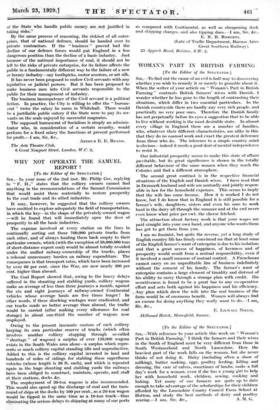WHY NOT OPERATE THE SAMUEL REPORT ?
[To the Editor of the SPECTATOR.] SIR,—In your issue of the 2nd inst. Mr. Philip Gee, replying to " F. H.," states that the colliery owners cannot find anything in the recommendations of the Samuel Commission that would assist them materially to restore prosperity to the coal trade and its allied industries.
It may, however, be suggested that the colliery owners have omitted to explore adequately the field of transportation, in which the key—in the shape of the privately-owned wagon —will be found that will immediately open the door of prosperity to all the basic, industries.
The expense involved at every station on the lines in continually sorting out these 700,000 private trucks from each other, and of always hauling them back empty to their particular owners, which (with the exception of 50,000,000 tons of short-distance export coal) would be almost totally avoided under the unified railway-ownership of the trucks, places a colossal unnecessary burden on railway expenditure. The consequence is that transport rates, which have been increased by over 60 per cent. since the War, are now nearly 200 per cent. higher than abroad.
The Coal Report showed that, owing to the heavy delays suffered in _the shunting and stabling yards, colliery wagons make an average of less than three journeys a month, against the six and eight journeys of railway-owned Continental vehicles whose average hauls are five times longer ! In other words, if these shocking wastages were eradicated, and our trucks made no better average than abroad, the traffic would be carried (after making every allowance for coal storage) in about one-third the number of wagons now employed.
Owing to the present insensate custom of each colliery keeping its own particular reserve of. trucks (which often involves another colliery stopping through so-called " shortage " of wagons) a surplus of over 150,000 wagons exists in the South Wales area alone—a surplus which repre- sents so much colliery capital standing idle and unproductive. Added to this is the colliery capital invested in land and hundreds of miles of sidings for stabling these superfluous vehicles (whose length is 20 ft. each), and which is repeated again in the huge shunting and stabling yards the railways have been obliged to construct, maintain, operate, and staff at their stations, docks &c.
The employment of 20-ton wagons is also recommended. This would also speed up the discharge of coal and the turn- round of ships at the docks by 100 per cent., as a 20-ton wagon would be- tipped in the same time as a 10-ton truck—thus eliminating the serious delays to shipping at many of our ports as compared with Continental, as well as cheapening dock and shipping charges. and also tipping dues.—I am, Sir, dre., E. R. B. ROBERTS,
(Late of Traffic Department, Buenos Aires Great Southern Railway).
25 Appaeh Road, Brixton, S.W. 2.
















































 Previous page
Previous page